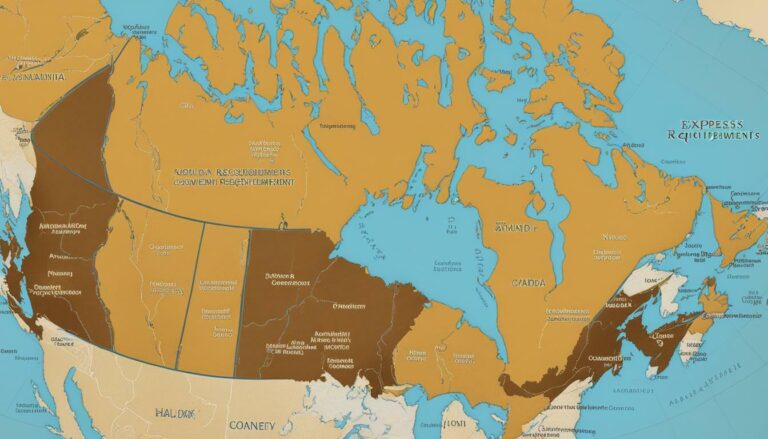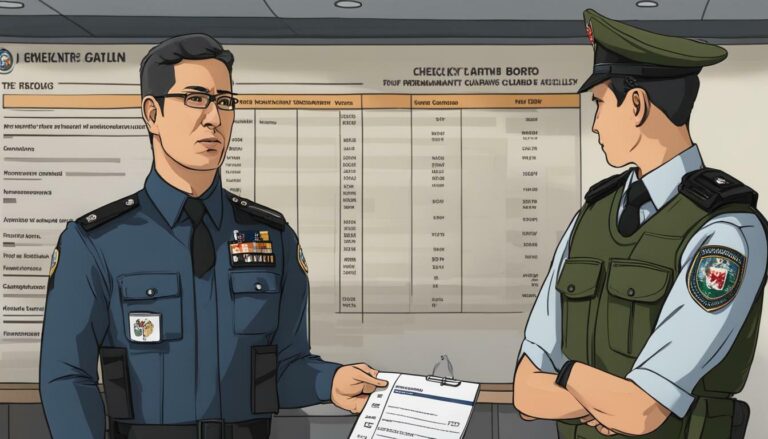Guide: How to Apply for a Temporary Work Permit in Canada
Applying for a temporary work permit in Canada requires careful preparation and knowledge of the application process. To begin, you will need a job offer from a Canadian employer who will apply for a Labour Market Impact Assessment (LMIA) from Employment and Social Development Canada (ESDC). The LMIA will determine if the employer can hire a foreign worker. There are various types of work permits available, depending on the specific needs of the applicant.
The application process involves submitting the necessary forms and supporting documents either online or in person at a Canadian Consulate Office. It is crucial to meet the eligibility criteria and understand the conditions of the work permit. Remember, temporary work permits are not permanent and will eventually expire.
Key Takeaways:
- Applying for a temporary work permit in Canada requires a job offer from a Canadian employer.
- The employer must apply for a Labour Market Impact Assessment (LMIA) to determine if they can hire a foreign worker.
- There are different types of work permits available, such as the Temporary Foreign Workers Program, Open Work Permit, Working Holiday Visa, and Post Graduate Work Permit.
- The application process involves submitting forms and supporting documents either online or in person at a Canadian Consulate Office.
- Temporary work permits are not permanent and will expire after a certain period of time.
Temporary Work Permit Eligibility
Before applying for a temporary work permit in Canada, it is important to understand the eligibility requirements. To be eligible for a work permit, you must have a job offer from a Canadian employer. The employer must apply for a Labour Market Impact Assessment (LMIA) from Employment and Social Development Canada (ESDC), which determines if they can hire a foreign worker. This assessment is conducted to ensure that hiring a foreign worker will not have a negative impact on the Canadian job market.
In addition to a job offer and a positive LMIA, there are other eligibility criteria that must be met. You must have a valid passport and be admissible to Canada, which means you must not have any criminal convictions or medical issues that could pose a risk to public health or safety. You must also convince an immigration officer that you will leave Canada at the end of your authorized stay.
Specific Requirements
Specific requirements may vary depending on the type of work permit you are applying for. For example, if you are applying for a Working Holiday Visa, you must be between the ages of 18 and 35 and hold a valid passport from an eligible country. On the other hand, if you are applying for a Post Graduate Work Permit, you must have completed a program of study at a designated learning institution in Canada and have a valid study permit.
| Work Permit Type | Specific Requirements |
|---|---|
| Temporary Foreign Workers Program | Positive LMIA, job offer, valid passport, admissibility |
| Open Work Permit | No job offer needed, valid passport, admissibility |
| Working Holiday Visa | Age requirement (18-35), valid passport from eligible country, admissibility |
| Post Graduate Work Permit | Completed program of study in Canada, valid study permit, admissibility |
It is important to review the specific requirements for the type of work permit you are applying for to ensure that you meet all the necessary criteria. Failing to meet the eligibility requirements may result in your application being rejected.
Types of Work Permits in Canada
Depending on your situation, there are different types of work permits you can apply for in Canada. These work permits are designed to cater to the needs of different individuals, whether they are international students, recent graduates, or skilled professionals. Let’s take a closer look at some of the most common types of work permits available:
1. Temporary Foreign Workers Program
The Temporary Foreign Workers Program allows Canadian employers to hire foreign workers when there is a shortage of qualified Canadian workers. To be eligible for this program, you will need a job offer from a Canadian employer who has obtained a positive Labour Market Impact Assessment (LMIA) from Employment and Social Development Canada (ESDC).
2. Open Work Permit
An Open Work Permit allows you to work for any employer in Canada, except for those who are not eligible to hire foreign workers or who have violated certain labor conditions. This type of work permit does not require a job offer, and you can apply for it if you meet the eligibility criteria.
3. Working Holiday Visa
The Working Holiday Visa is designed for young individuals who want to work and travel in Canada. This visa allows you to work for any employer in Canada and is open to citizens of countries that have a bilateral youth mobility arrangement with Canada. The eligibility requirements and application process may vary depending on your country of citizenship.
4. Post Graduate Work Permit
If you have recently graduated from a designated learning institution in Canada, you may be eligible for a Post Graduate Work Permit. This permit allows you to gain valuable work experience in your field of study and is usually valid for the same duration as your study program, up to a maximum of three years.
| Work Permit Type | Job Offer Required? | Employer Restrictions | Duration |
|---|---|---|---|
| Temporary Foreign Workers Program | Yes | Depends on LMIA | Varies |
| Open Work Permit | No | Some restrictions apply | Varies |
| Working Holiday Visa | No | No restrictions | Up to 24 months, depending on country |
| Post Graduate Work Permit | No | No restrictions | Duration of study program, up to 3 years |
Please note that these are just a few examples of the types of work permits available in Canada. The specific eligibility requirements and application process may vary for each type. It is important to consult the official website of Immigration, Refugees and Citizenship Canada (IRCC) or seek professional advice to ensure you have the most up-to-date information and guidance when applying for a work permit in Canada.
The Application Process
The application process for a temporary work permit in Canada involves several steps that need to be followed carefully. To begin, you must have a job offer from a Canadian employer who has obtained a positive Labour Market Impact Assessment (LMIA) from Employment and Social Development Canada (ESDC). This assessment ensures that the employer has made efforts to hire a Canadian worker but was unsuccessful, and therefore needs to hire a foreign worker.
Once you have a job offer and a positive LMIA, you will need to gather the necessary documents and forms to submit your application. These forms can be found on the official website of Immigration, Refugees and Citizenship Canada (IRCC). It is important to fill out the forms accurately and completely, providing all required information and supporting documents.
After completing the forms, you can submit your application either online, through the IRCC website, or in person at a Canadian Consulate Office in your home country. The processing time for work permit applications can vary depending on factors such as the type of work permit and the volume of applications being processed. It is recommended to submit your application well in advance of your intended start date to allow for processing time.
The Required Documents for a Work Permit Application
| Document | Description |
|---|---|
| Valid Passport | A copy of your valid passport, including the biographical page and any pages showing previous visas or travel history. |
| Job Offer Letter | A letter from your Canadian employer detailing the job offer, including the position, salary, and duration of employment. |
| Educational Credentials | Copies of your educational certificates, diplomas, or degrees that are relevant to the job offer. |
| Proof of Financial Support | Evidence that you can financially support yourself during your stay in Canada, such as bank statements or sponsorship letters. |
It is important to ensure that you include all the necessary documents with your application to avoid any delays or rejection. Missing documents can result in the refusal of your application. Once your application is approved, you will be issued a work permit that specifies the duration and conditions of your employment in Canada. Remember to respect the conditions of your work permit and to maintain legal status while awaiting the decision on your application.
Required Documents and Checklist
To apply for a temporary work permit in Canada, you will need to gather several important documents. These documents are essential in proving your eligibility and supporting your application. Here is a checklist of the documents you will need:
- A valid passport: Your passport must be valid for the entire duration of your intended stay in Canada.
- Job offer letter: You will need a letter from a Canadian employer offering you a job. This letter should outline the details of your employment, including the position, salary, and duration of the job.
- Educational credentials: Depending on the type of work permit you are applying for, you may need to provide proof of your educational qualifications. This can include diplomas, degrees, or certificates.
- Proof of financial support: You may be required to show that you have enough funds to support yourself and any accompanying family members during your stay in Canada. This can be in the form of bank statements, pay stubs, or a letter of financial support from a sponsor.
- Labour Market Impact Assessment (LMIA), if applicable: If your job offer requires an LMIA, the employer will need to provide this document as part of the application process.
It is important to note that these are general requirements, and additional documents may be requested depending on your specific situation. It is recommended to consult the official website of Immigration, Refugees and Citizenship Canada (IRCC) or seek professional advice to ensure that you have all the necessary documents for your work permit application.
| Document | Description |
|---|---|
| Valid Passport | Your passport must be valid for the entire duration of your intended stay in Canada. |
| Job Offer Letter | A letter from a Canadian employer offering you a job, outlining the details of your employment. |
| Educational Credentials | Proof of your educational qualifications, such as diplomas, degrees, or certificates. |
| Proof of Financial Support | Evidence that you have enough funds to support yourself and any accompanying family members during your stay in Canada. |
| Labour Market Impact Assessment (LMIA) | If your job offer requires an LMIA, the employer will need to provide this document. |
By ensuring that you have all the necessary documents, you can increase your chances of a successful work permit application. Remember to double-check the document requirements for your specific work permit category and consult the official IRCC website or seek professional advice for the most up-to-date and accurate information.
Applying for a Work Permit from Inside Canada
If you are already in Canada, you may be eligible to apply for a work permit from inside the country. This option can be advantageous for individuals who are already settled in Canada and have secured a job offer from a Canadian employer. Applying for a work permit from inside Canada can save time and eliminate the need to leave the country for the application process.
The processing time for work permits applied from inside Canada is generally shorter compared to applying from outside the country. According to recent statistics, the average processing time for work permit applications submitted from within Canada is around 10 weeks. However, processing times can vary depending on factors such as the type of work permit and the volume of applications received by Immigration, Refugees and Citizenship Canada (IRCC).
When applying for a work permit from inside Canada, it is important to ensure that you meet all the eligibility requirements and have the necessary documents ready. This includes a valid job offer, proof of legal status in Canada, and any supporting documents specific to your situation. It is also essential to pay the work permit fee, which varies depending on the type of work permit you are applying for.
| Type of Work Permit | Processing Time | Work Permit Fee |
|---|---|---|
| Temporary Foreign Workers Program | 10 weeks on average | $155 CAD |
| Open Work Permit | 10 weeks on average | $100 CAD |
| Working Holiday Visa | 8 weeks on average | $153 CAD |
| Post Graduate Work Permit | 12 weeks on average | $155 CAD |
It’s essential to note that while applying from inside Canada is a convenient option, it is crucial to maintain legal status throughout the application process. This means ensuring that your current visa or work permit remains valid until a decision is made on your application. Failing to maintain legal status can result in complications and possibly affect the outcome of your work permit application.
Understanding Work Permit Conditions
While holding a temporary work permit in Canada, it is essential to understand and abide by the permit conditions. These conditions are set by immigration authorities and must be followed to ensure compliance with Canadian laws and regulations. Failure to adhere to these conditions could result in the revocation of the work permit and potential deportation.
The specific conditions of a temporary work permit can vary depending on the type of permit and the individual circumstances. However, there are some common conditions that apply to most work permits. These include:
- Working for the specific employer named on the work permit. It is important to note that work permits are employer-specific, meaning that you are only authorized to work for the employer mentioned on your permit.
- Working in the specific occupation approved by the work permit. The occupation you are authorized to work in will be specified on your permit, and you must ensure that your employment aligns with this approved occupation.
- Adhering to the duration of the work permit. Work permits have an expiration date, and it is important to respect this timeline. If you wish to extend your stay or continue working in Canada, you will need to apply for an extension before your permit expires.
- Complying with Canadian laws and regulations. While in Canada on a temporary work permit, you are expected to follow all federal, provincial, and municipal laws and regulations. This includes rules regarding employment, taxation, and healthcare.
- Leaving Canada when the work permit expires. Temporary work permits are not a pathway to permanent residency, and it is important to understand that you must leave Canada once your permit expires, unless you have obtained another legal status or work authorization.
It is crucial to fully comprehend and respect these conditions to maintain your legal status in Canada and ensure a successful temporary work experience in the country. By abiding by the permit conditions, you can avoid complications and potential legal issues during your stay.
Work Permits and Permanent Residency
While temporary work permits do not automatically lead to permanent residency, there are programs that offer pathways to Canadian citizenship. One such program is the Canadian Experience Class (CEC), which is designed for temporary foreign workers who have gained skilled work experience in Canada. To be eligible for the CEC, applicants must have at least one year of skilled work experience in Canada, meet language requirements, and plan to live outside the province of Quebec.
Another option is the Opportunities Ontario: Provincial Nominee Program (PNP). This program allows provinces and territories in Canada to nominate individuals who have the skills and experience needed in their local labor markets for permanent residency. Each province and territory has its own specific criteria and requirements for the PNP, so it is important to research the program in the province or territory where you plan to work.
It is worth noting that the process of obtaining permanent residency can be complex and time-consuming. It is advisable to seek professional advice or consult official government websites for up-to-date information on eligibility criteria and application procedures.
Achieving Permanent Residency: A Step Towards Canadian Citizenship
Upon obtaining permanent residency, individuals can enjoy many of the same rights and privileges as Canadian citizens, including access to healthcare, education, and social benefits. Permanent residents also have the opportunity to apply for Canadian citizenship after meeting certain criteria, such as residing in Canada for a specified period of time, demonstrating language proficiency, and passing a citizenship test.
| Program | Eligibility |
|---|---|
| Canadian Experience Class (CEC) | – At least one year of skilled work experience in Canada – Meet language requirements – Plan to live outside the province of Quebec |
| Opportunities Ontario: Provincial Nominee Program (PNP) | – Meet specific criteria and requirements of the province or territory |
Applying for permanent residency through these programs can provide temporary foreign workers with a pathway to long-term settlement in Canada and the opportunity to fully integrate into Canadian society.
Tips for a Successful Work Permit Application
Follow these tips to increase your chances of a successful work permit application in Canada:
- Gather all relevant documents: Ensure that you have all the necessary documents for your work permit application. This includes a valid passport, job offer letter, educational credentials, and proof of financial support. Providing accurate and complete information is crucial to avoiding delays or rejection of your application.
- Submit your application on time: Be mindful of the submission deadlines for your work permit application. Timely submission is important to avoid any unnecessary complications. Remember that processing times can vary, so it’s best to apply well in advance of your intended start date.
- Prepare for the interview: In certain cases, you may be required to attend an interview as part of the work permit application process. Prepare for the interview by researching the company, understanding your role, and practicing common interview questions. This will help you make a positive impression on the visa officer and increase your chances of approval.
Remember, the application process can be complex, so it’s advisable to seek professional guidance when needed. A qualified immigration consultant or lawyer can assist you with navigating the application process and ensuring that you meet all the requirements.
By following these tips and taking the necessary steps to prepare your work permit application, you can increase your chances of success and be one step closer to working in Canada!
| Tip | Summary |
|---|---|
| Gather all relevant documents | Collect all necessary documents such as a valid passport, job offer letter, educational credentials, and proof of financial support. Ensure accuracy and completeness. |
| Submit your application on time | Respect the submission deadlines and apply well in advance to avoid complications. Note that processing times can vary. |
| Prepare for the interview | Research the company, understand your role, and practice common interview questions if required. Making a positive impression can increase your chances of approval. |
Work Permit Processing Time and Fee
The processing time and fee for a work permit application in Canada depend on various factors. The specific type of work permit you are applying for, the volume of applications received by Immigration, Refugees and Citizenship Canada (IRCC), and the complexity of your case can all influence the processing time. It is important to note that these times are estimates and can vary.
On average, the processing time for a work permit application can range from a few weeks to several months. For certain types of work permits, such as the Post Graduate Work Permit, the processing time may be faster. However, it is advisable to submit your application well in advance of your planned start date to allow for any unforeseen delays.
In terms of fees, the cost of a work permit application can vary depending on the type of permit and the location where you are applying. The basic work permit fee is CAD 155. In addition to this, there may be additional fees for biometrics (if applicable) and for dependents included in the application. It is important to check the most up-to-date fee information on the official IRCC website before submitting your application.
Work Permit Processing Time
| Type of Work Permit | Processing Time |
|---|---|
| Temporary Foreign Workers Program | Varies |
| Open Work Permit | Varies |
| Working Holiday Visa | Varies |
| Post Graduate Work Permit | Approximately 4-5 months |
It is important to remember that the processing time mentioned in the table above is just an estimate and may be subject to change. The immigration authorities aim to process work permit applications as efficiently as possible, but there are numerous factors that can impact the processing time, such as the volume of applications and the complexity of each case. Therefore, it is advisable to submit your application well in advance and be prepared for some variation in the processing time.
In conclusion, the processing time and fee for a work permit application in Canada can vary depending on several factors. It is essential to thoroughly review the specific requirements for your desired work permit and ensure that all necessary documents are included in your application. By understanding the processing time and fee associated with your application, you can plan accordingly and avoid unnecessary delays or complications in obtaining your temporary work permit in Canada.
Conclusion
Applying for a temporary work permit in Canada requires careful planning and understanding of the application process, but it can lead to exciting work opportunities in the country. To begin the process, you will need a job offer from a Canadian employer, who will then apply for a Labour Market Impact Assessment (LMIA) from Employment and Social Development Canada (ESDC). This assessment determines if the employer can hire a foreign worker.
There are various types of work permits available, including the Temporary Foreign Workers Program, Open Work Permit, Working Holiday Visa, and Post Graduate Work Permit. Each type has its own specific requirements and eligibility criteria. It is important to identify which permit suits your needs and qualifications.
The application process involves submitting the necessary forms and supporting documents either online or in person at a Canadian Consulate Office. It is crucial to ensure that all required documents are included to avoid delays or rejection of your application. Once you have been granted a work permit, it is essential to respect the conditions and restrictions that come with it.
While a temporary work permit in Canada is not a direct pathway to permanent residency, there are programs such as the Canadian Experience Class (CEC) and Opportunities Ontario: Provincial Nominee Program (PNP) that provide options for temporary foreign workers to apply for permanent residency. It is advisable to explore these opportunities if you are interested in settling in Canada permanently.
FAQ
Q: What do I need to apply for a temporary work permit in Canada?
A: You will need to have a job offer from a Canadian employer and the employer must apply for a Labour Market Impact Assessment (LMIA) from Employment and Social Development Canada (ESDC) to determine if they can hire a foreign worker. Different types of work permits are available depending on your needs.
Q: What are the eligibility criteria for a temporary work permit?
A: The eligibility criteria include having a job offer from a Canadian employer, obtaining an approved LMIA, having a valid passport, and meeting the specific requirements for the type of work permit you are applying for.
Q: What types of work permits are available in Canada?
A: There are different types of work permits available, including the Temporary Foreign Workers Program, Open Work Permit, Working Holiday Visa, and Post Graduate Work Permit. Each type has its own purpose and requirements.
Q: How do I apply for a temporary work permit?
A: The application process involves submitting the necessary forms and supporting documents either online or in person at a Canadian Consulate Office. It is important to carefully follow the instructions and meet all the eligibility criteria.
Q: What documents do I need to include in my work permit application?
A: You will need to include documents such as a valid passport, job offer letter, educational credentials, and proof of financial support. It is important to provide all the necessary documents to avoid delays or rejection of your application.
Q: Can I apply for a work permit from inside Canada?
A: If you are already in Canada, you may be eligible to apply for a work permit from inside the country. However, there are certain criteria and limitations that you need to be aware of. It is important to maintain legal status while awaiting the work permit decision.
Q: What are the conditions of a work permit in Canada?
A: A work permit in Canada comes with certain conditions and restrictions. These include the duration of the permit, the employer-specific nature of the permit, and the need to comply with Canadian immigration laws. It is important to respect these conditions to avoid future complications.
Q: Can a temporary work permit lead to permanent residency in Canada?
A: While work permits are not a direct pathway to permanent residency, there are programs such as the Canadian Experience Class (CEC) and Opportunities Ontario: Provincial Nominee Program (PNP) that allow temporary foreign workers to apply for permanent residency. It is important to explore these options if you are interested in settling in Canada permanently.
Q: What tips can you provide for a successful work permit application?
A: Some tips for a successful work permit application include thorough document preparation, timely submission of the application, providing accurate and complete information, and seeking professional advice if needed. It is important to make the application process as smooth as possible.
Q: How long does it take to process a work permit application and what are the fees?
A: The processing time for work permit applications can vary depending on factors such as the type of work permit and the volume of applications. It is recommended to check the official website for the most current processing times. There are applicable fees for work permit applications, and it is important to be aware of any additional costs that may be associated with the application process.
Source Links
- https://visaguide.world/canada-visa/temporary/work/
- https://www.immigration.ca/required-documents-for-canadian-temporary-work-permit/
- https://settlement.org/ontario/immigration-citizenship/immigrating-to-ontario/immigration-categories/how-do-i-come-to-canada-as-a-temporary-foreign-worker/







